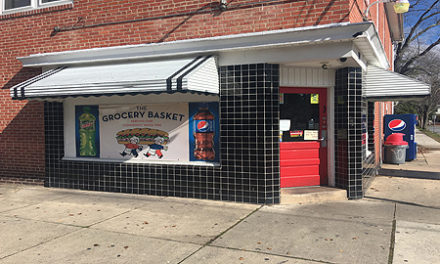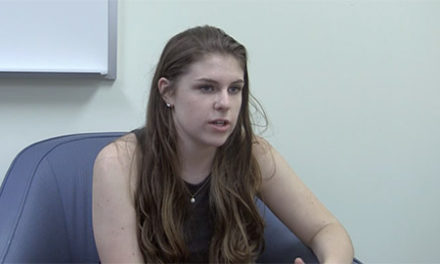by Emily Temple and Jake Bradner (Whetstone Staff Writers)
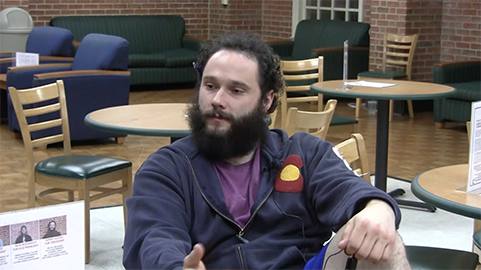
Kenny Ciccoli
In January, Wesley put in place recycling bins for students and faculty to use. Â While the bins have arrived, however, awareness on campus is still catching up. Â
“There’s a huge culture change that needs to happen here at Wesley College, it’s about people’s mentality when it comes to recycling,†said Kenny Ciccoli, a member of the organization Sustainable Wesley. Â
“I saw ketchup in [a recycling bin] one day and I got a little frustrated.  They don’t really think about it, they’re not careful or concerned about where they put it.â€
Ciccoli is one of a few collaborators who put together the recycling program at Wesley. Â
“Initially the project was between myself and Rick Richardson, and Fran Riddle played a hand in getting people together,†Ciccoli said. Â
“Once we got into the nitty-gritty things seemed like they were gonna work out, and Rick ended up passing the duties to Shavonna Martinez to make sure that everything was running clean.â€
Dr. Stephanie Stotts, a professor of environmental science, worked with Sustainable Wesley for about a year on the project. Â
“I came in kind of in the middle of this,†Stotts said. Â
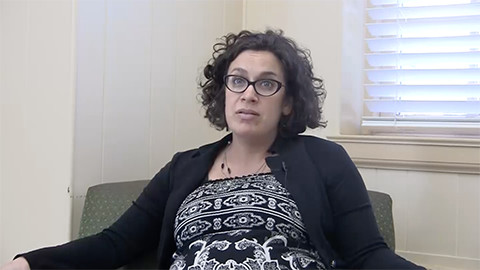
Dr. Stephanie Stotts, Assistant Professor of Environmental Studies
“We had a professor, Dr. Kent Hurst, who wrote the original grant. Then Dr. Hurst left the institution and we had been awarded the money, but there was nobody to pick up from there.  So I came in, got the bins ordered, and worked with Sustainable Wesley, so I’ve been involved with the project for about a year.”
The grant, which came from the Delaware Department of Natural Resources and Environmental Control (DNREC), was acquired well before Sustainable Wesley was established as an organization on campus. Â This grant of $47,000, after negotiations with the manufacturer Busch Systems, allowed for the purchase of about 1,200 bins.Â
There are four different types of recycling bins around campus: dormitory bins, Infinite bins, Sentry bins, and Aristata bins. Â
The ones in the dormitories are transported by students to the containers behind Malmberg and Zimmerman, or behind Roe and Williams. Â Others, such as the Infinite in classrooms and the Sentry on sidewalks, are taken out by maintenance every once in a while, the same as trash. Â
“We are under contract with a company that comes and removes our waste and recycling,†Ciccoli said.  “We pay $170 per trash removal and about $70 for recycling removal. The same company does it, they’ve just got different trucks for the job.
RPJ Waste Services, the company handling Wesley’s recycling and trash disposal, runs a single-stream commercial recycling program. Â This means that multiple recyclable materials, such as paper, plastic bottles, and metal cans are collected in one frontload container, such as those between Zimmerman and Malmberg, or Roe and Williams. Â
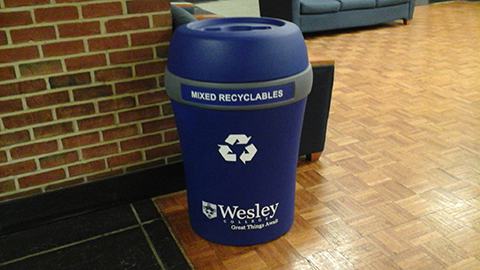
The Infinite Recycling Bin
“Delaware does not have a recycling facility,†Stotts said.  “All recycling companies in Delaware collect the recycling, then load it onto boats, which are then taken to single-stream recycling facilities that are in other states.
According to the RPJ site, they deliver Wesley’s recyclable materials to a Materials Recovery Facility (MRF) to be prepared for use in various markets. Â
While the cost of recycling with RPJ is significantly lower than that of trash removal, the economic impact won’t be immediate. Â
“There is a slight increase in cost currently because we have increased the frequency of collection for the recycle dumpsters on campus,†said Rick Richardson, the physical plant director at Wesley. Â
“This increase in cost should be offset by a reduction in frequency of collection for the trash dumpsters in time.â€
“Wesley’s recycling program is based on a commitment to sustainability more than the economic impact.â€
Stotts agrees. Â
“Recycling is one of those things that sometimes you do because it’s the right thing to do,†Stotts said.  “It’s great when it lines up economically, but it doesn’t always.â€
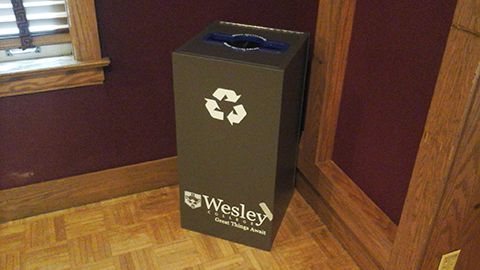
The Aristata Recycling Bin
Whether or not it significantly affects Wesley’s finances, however, the cost of recycling does indicate how well Wesley has adjusted. Â
If a bin contains too many non-recyclable materials, Wesley would be charged the full price of trash disposal rather than the cost of recycling. Â
“I think are percentages are more towards recycling in the recycling bin,†Ciccoli said.  “If they weren’t, we’d be getting charged more, and that isn’t happening.â€
“I feel like we’re a pretty recycling-literate society,†Stotts said.  “People may be throwing things in that can’t be recycled, but for the most part I don’t think that’s a huge concern.†Â
Both Ciccoli and Stotts envision recycling as a natural part of Wesley’s future. Â
“It would be awesome, and certainly good environmentally, if we were recycling more than we were throwing out,†Stotts said. Â
“As the culture changes, the needs will change, and we’ll have to react to the needs until everybody’s recycling,†Ciccoli said. Â


